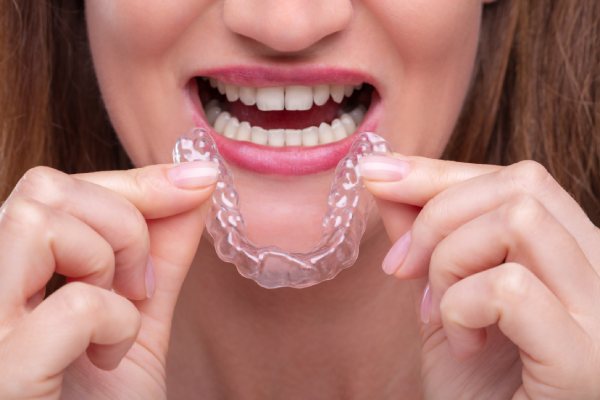Whether you have been formally diagnosed with sleep bruxism (the scientific term for grinding or clenching your teeth while you sleep) or you believe you may have it, experts agree that wearing a protective night guard is one of the best things you can do. Of course, knowing that you should invest in a nightguard and actually doing so can be very different things. This article will explore every step of the process, from defining the symptoms associated with sleep bruxism to how to select a guard that suits your needs.
Sleep Bruxism Explained
Doctors aren’t sure why some people grind their teeth at night, but there are several potential risk factors. If you deal with stress or anxiety, you are more likely to clench your teeth at night than others. Individuals with abnormal bites caused by missing or crooked teeth also seem to grind more often than the general public. Similarly, certain sleep disorders are associated with sleep bruxism. A 2016 study in the Journal of the American Dental Association also revealed that consumers of alcohol and tobacco products are up to twice as likely to grind their teeth.
You could have sleep bruxism even if you don’t fit any of these high-risk criteria, so the best thing to do is consider your symptoms. If you regularly wake up with jaw discomfort, experience frequent morning headaches, or struggle with insomnia, you should consider the possibility that sleep bruxism is to blame. Likewise, you may have sleep bruxism if you wake up with unexplained dental or orthodontic damage. If your partner complains that you make loud grinding noises as you sleep, that can also be an indication that you need to do something.
What to Do About It
Unfortunately, there are no known cures for sleep bruxism. If you were hoping for a pill or surgical solution for your problems, you will be disappointed. Thankfully, many people find that simply wearing a retentive nightguard every night significantly mitigates or even eliminates their symptoms.
If you are familiar with why athletes wear mouthguards to protect themselves from oral injury, you already understand the basics of how night guards work. A night guard is really just a cushion that prevents your upper and lower jaws from physically touching each other, reducing the damage caused by nighttime teeth grinding.
Selecting the Right Night Guard
The most important thing to consider when selecting a nightguard is comfort. If your guard makes it difficult for you to breathe or compromises your ability to communicate with your significant other, you may not wear it when you’re supposed to. Obviously, even the best guard will do nothing if you’re not wearing it at night.
If you wear braces or other special dental equipment, it is best to look for a guard made specifically to accommodate them. For example, some boil-and-bites can be molded to your specific bite after every orthodontic adjustment, providing much more value to people with braces than guards that can only be molded once before their retentive properties diminish.
Price is also a vital consideration. Night guards are available at a variety of price points, ranging from a few backs for OTC (or over the counter) options to thousands of dollars to have a dentist custom-fit a guard to your mouth. Some OTC options are just as effective as their professional counterparts, so don’t assume that spending more money will automatically yield better results. That said, you should watch out for guards made out of inferior materials that you can grind straight through.
Dental insurance will generally pick up at least some of the tab for nightguards, especially if your smile has been visibly damaged by teeth clenching. Every policy differs though, so you should ask your provider what they would be willing to pay for.
Parting Thoughts
Sleep bruxism sounds scary, but you may find relief through the simple act of wearing a night guard when you go to bed. If you frequently wake up with a sore mouth, damaged braces, or unexplained headaches, adding a nightguard to your bedtime routine could help reduce the impact your symptoms have on your everyday life. You may be surprised by the difference it can make!


